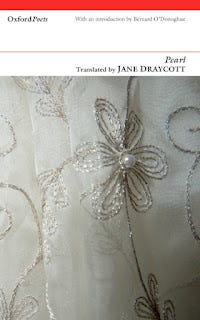The 'Pearl' Poem: Bernard O'Donoghue explains Jane Draycott's translation
Tomorrow, Jane Draycott will read from her work at Poets and Players, at the Whitworth Art Gallery in Manchester (the event is free and all are welcome: for more information, click here).
[07 March 2012: Thank you to everyone who came to the reading! Please click here to find audio recordings.]

Her latest Carcanet book is Pearl (2011), a new and critically acclaimed translation of the medieval poem by the author of Sir Gawain and the Green Knight. In his introduction, Bernard O'Donoghue explains what makes the poem - and Jane Draycott's translation - unique. In today's blog, we have extracted a small part of his introduction.
To order a copy of Pearl directly from Carcanet for £8.96 with free UK delivery, click here.
*
...A.C. and J.J. Anderson say, rightly, 'from the point of view of its metrical form, Pearl is probably the most complex poem written in English.' Like Gawain, though less absolutely, it uses alliteration; but that is only the start of its formal devices. It is made up of 101 twelve-line stanzas, with an intricate rhyme-scheme and a recurring link-word at the start and end of each group of five stanzas. The recurring link-words carry the poem's themes consistently, and the last line links back to the first (as in Finnegans Wake). As with the [Cotton Nero A x] manuscript's other poems, there is a great range of lexical diversity: English, French and Norse vocabulary, and variation in register from the French elegance of courtly love to the colloquial of northern English.
So the decision to be made by the translator of Pearl is altogether more difficult [than the decision to be made by the translator of Sir Gawain]. How many of these interlocked formalities will the modern version attempt to reproduce? Some of the traditional translations have coped pretty well: notably Tolkien and Borroff. But with them you never feel you are reading something which is at once close to the original and readable in its own right as a new poem. This is what Jane Draycott's new translation does so remarkably. Her great achievement is to produce a stanza-for-stanza and largely line-for-line translation which manages to retain total freedom in modern English. As with Seamus Heaney's Beowulf, when the alliteration offers itself in an unforced modern idiom, Draycott uses it. Perhaps the most rewarding of all, she is always ready to free of the line-ending by introducing an enjambment which (as critics such as Donald Davie and Christopher Ricks have shown) has had such an enlivening effect in English poetry since Milton...
Introduction © Bernard O'Donoghue 2011
To order a copy of Pearl directly from Carcanet for £8.96 with free UK delivery, click here.




